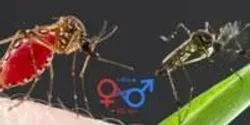Viruses

Spiny lobsters practice “behavioral immunity” to create safe havens that prevent them from contracting a lethal disease in the wild, an important finding for the $50 million annual spiny lobster fishery in Florida, according to a new study co-authored by a University of Florida scientist.

Agricultural officials who seek to detect diseases affecting the commercial swine industry may gain a new ally — a biological detection system developed by Lawrence Livermore National Laboratory (LLNL) researchers.

The switchgrass exhibited mosaic symptoms—splotchy, discolored leaves—characteristic of a viral infection, yet tested negative for known infections. Deep sequencing, a new technology, revealed the plants were infected with a new virus in the genus mastrevirus, the first of its kind found in North America.

A newly developed spectroscopy method is helping to clarify the poorly understood molecular process by which an anti-HIV drug induces lethal mutations in the virus’ genetic material. The findings from the University of Chicago and the Massachusetts Institute of Technology could bolster efforts to develop the next generation of anti-viral treatments.

Research from the University of Manchester using cutting edge computer analysis reveals that despite mutating, Ebola hasn’t evolved to become deadlier since the first outbreak 40 years ago.













